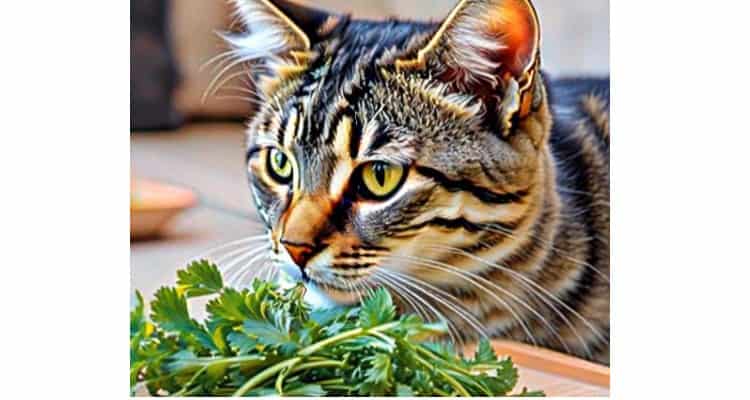Herbs and spices can flavor our foods, but what about our feline companions? Are herbs like cilantro safe for cats, or could they be dangerous?
As cat owners, we only naturally want to share tasty foods and flavors with our furry friends. However, some human foods that we enjoy can be harmful to cats.
When it comes to herbs like cilantro, it’s crucial to understand how they may affect your cat’s health before offering them a taste.
In small amounts, herbs can be an exciting new flavor for cats. But in larger quantities, some herbs may cause gastrointestinal upset, toxicity, or other adverse effects in cats.
Cats have different nutritional needs than humans, so not everything we eat is safe.
So, should cats eat cilantro? Is cilantro bad for cats or perfectly fine for feline tummies? Let’s find out.
Cats and Herbs
Cats are obligate carnivores, meaning their bodies require much more animal-based proteins compared to humans, who are omnivores.
Cats have evolved to consume a meat-heavy diet and lack certain enzymes to digest and utilize nutrients from plant sources properly.
While humans can safely consume a wide range of herbs, spices, vegetables, and fruits, many of these foods can be toxic for cats.
Herbs contain aromatic oils, phenols, and active phytochemical compounds that may be harmless to people but can cause illness in felines.
Cats also lack the liver enzymes to metabolize certain compounds found abundantly in herbs and plants correctly.
Due to their unique physiology and metabolism, cats should generally only consume herbs under veterinary guidance.
Owners must know which herbs are toxic for cats and which are safe in limited amounts or prepared correctly.
Even natural substances can cause adverse reactions in cats. Consulting a vet is the safest approach before intentionally feeding your feline companion any herbs, spices, or seasonings.
Is Cilantro Toxic to Cats?
Cilantro is not toxic to cats and cannot cause poisoning or life-threatening conditions. However, some cats may experience an upset stomach or diarrhea after eating cilantro.
This is because cilantro contains volatile oils that irritate some cats’ digestive systems. The oils give cilantro its spicy, aromatic flavor, but not all cats can tolerate them well.
Some cats lack sufficient enzymes to break down the oils found in cilantro. When these oils pass through the digestive tract undigested, they can cause inflammation of the stomach lining and intestines, resulting in vomiting, diarrhea, and other gastric upset.
The impact varies between individual cats. Some cats can eat small amounts of cilantro without issue, while others seem especially sensitive. Kittens and cats with gastrointestinal problems may be most at risk of adverse effects.
So, while cilantro is not poisonous, it’s best to avoid feeding cats large quantities due to the risk of stomach upset and associated discomfort.
Check with your vet if you notice any concerning symptoms after your cat consumes cilantro.
Cilantro Nutrition Facts
Cilantro is an herb popular in many cuisines around the world. It provides important nutrients and health benefits for humans.
Cilantro is a good source of vitamins A, K, and C. It also contains minerals like calcium, iron, and potassium.
The herb has antioxidant and anti-inflammatory properties. Some research indicates cilantro may help lower people’s cholesterol and blood sugar levels.
However, cats cannot digest plant compounds as efficiently as humans can. The nutritional benefits that cilantro provides to people do not necessarily apply to felines.
Cats are obligate carnivores, and their bodies are adapted to deriving nutrients from meat, not plants.
While cilantro does contain some vitamins, cats get these same nutrients in more significant bioavailable amounts from animal-based ingredients like meat, eggs, and fish.
Cats lack specific enzymes and gut bacteria to digest and utilize compounds found in herbs and vegetables properly.
So, even though cilantro offers some nutritional value for humans, it does not provide the same benefits for cats. The nutrients in cilantro are not essential or even usable for felines from a biological standpoint.
Serving Cilantro to Cats
While adult cats can consume small amounts of cilantro as an occasional treat, it’s generally best to avoid serving it or allowing your cat access to it.
Cats have different nutritional requirements than humans and cannot digest certain compounds found in herbs and vegetables.
Cilantro contains antioxidants, phytonutrients, and fiber that are beneficial for humans. But these provide little nutritional value for felines.
More importantly, cilantro contains volatile oils that can cause gastrointestinal upset in cats when consumed in larger quantities.
The safest bet is to keep cilantro out of reach of curious cats. If you want to offer a small taste, limit it to a pinch of freshly chopped leaves occasionally. Monitor your cat for any signs of stomach upset afterward.
Some commercial cat foods include cilantro in tiny amounts as a flavoring. This is likely safe, as it is a tiny fraction of the recipe.
However, choosing cat foods without herbs, spices, or vegetables on the ingredients list is still ideal. Cats don’t need these extras.
The takeaway is that while a tiny taste of cilantro likely won’t harm an adult cat, offering it has no benefit.
Sticking to high-quality proteins, fats, and amino acids is better to meet your cat’s needs. Avoid offering cilantro altogether if you have any concerns about stomach sensitivity.
And never let your cat freely nibble on or eat large amounts of cilantro, as toxicity is possible.
Signs of Cilantro Poisoning
Cilantro is generally safe for cats when consumed in small amounts. However, some cats may experience mild digestive upset if they overeat cilantro. The most common symptoms include:
- Upset stomach
- Vomiting
- Diarrhea
These signs are similar to when a cat eats something new that doesn’t agree with them. They are not severe or life-threatening.
Cats may vomit if they eat a large quantity of cilantro. The vomiting is the body’s way of expelling the herb. Diarrhea may follow afterward as the gastrointestinal tract tries to flush out the irritant.
Cats experiencing vomiting or diarrhea after eating cilantro should be encouraged to drink water to stay hydrated. Withholding food for 12-24 hours allows the stomach to rest and recover.
Signs usually resolve on their own within a day or two. Veterinary care should be sought if symptoms persist for over two days or if the cat seems lethargic or distressed.
Overall, cilantro is not toxic to cats in small amounts. Mild digestive upset is the most common reaction. Complete recovery is expected with rest and supportive care.
Alternatives for Cats
Cats often enjoy chewing on plants, which can seem concerning for owners worried about toxicity. Fortunately, there are many healthy, pet-safe alternatives to offer your cat instead of cilantro.
One great option is cat grass, a specific variety grown for feline consumption. Cat grass provides fiber and aids digestion.
It also satisfies your cat’s natural urge to munch on greenery. Look for kits at the pet store to grow cat grass quickly at home.
Many cats also like non-toxic catnip, which acts as a stimulant when cats eat or smell it. Buy dried or catnip toys to give your cat something enticing yet safe to chew and play with.
Additional herbs considered safe for cats include dill, fennel, lemon balm, mint, oregano, parsley, rosemary, and thyme.
Use caution when introducing new herbs, and watch for any signs of stomach upset. Herbs should always be given in moderation.
Providing alternatives made explicitly for cats can prevent potentially dangerous interest in houseplants.
Keep all houseplants out of reach and train your cat not to chew on any greenery. With tasty, healthy options available, your cat won’t feel tempted to nibble where they shouldn’t.
When to See a Vet
If your cat ingests cilantro and starts exhibiting symptoms of poisoning or illness, it’s important to monitor them carefully.
In most cases, mild cilantro poisoning will resolve within 24 hours as the chemicals are processed out of your cat’s system.
However, you should take your cat to the veterinarian immediately if:
- Symptoms persist or get worse beyond 24 hours after ingestion. Extended nausea, vomiting, diarrhea, lethargy, or other symptoms may indicate a larger issue requiring medical intervention.
- Your cat stops eating or drinking for more than 24 hours after ingestion. This can quickly lead to dehydration, which is dangerous for cats. Lack of appetite and dehydration require vet care.
- There are signs of liver or kidney damage. Since cilantro may affect liver enzymes and kidney function, watch for symptoms like yellowing of gums, vomiting, dark or bloody urine, or abdominal pain or swelling. These warrant an urgent vet visit.
- Your cat seems seriously ill or is non-responsive. If your cat collapses, has seizures, difficulty breathing, or other signs of a poisoning emergency, seek vet care immediately. Time is critical.
In most mild cases, cilantro poisoning will pass on its own. But it’s important to monitor your cat closely and don’t hesitate to call your vet if symptoms last more than 24 hours or if you have other concerns.
Dehydration, kidney damage, and other secondary issues can arise, so don’t take chances with your cat’s health. Call your vet promptly if problems persist after accidental cilantro ingestion.
Preventing Accidental Ingestion
Keeping cilantro out of your cat’s reach is the best way to prevent them from accidentally ingesting it.
Store any fresh or dried cilantro in sealed containers in cupboards, refrigerators, or kitchen areas your cat can’t access.
Keep any cilantro-containing foods like salsas or guacamole away from where your cat could get to them.
When cooking or garnishing with cilantro, keep a close eye on your cat to ensure it doesn’t jump onto the counter or table to steal a bite.
It’s best to shut cats into another room while preparing food with cilantro so there’s no chance of them getting into it.
Clean up thoroughly, and don’t leave any scraps or dishes containing cilantro residue around where your cat could lick them.
Taking precautions like these will help prevent unfortunate accidents involving your cat ingesting cilantro.
Conclusion
In summary, while cilantro is not toxic to cats, it’s generally not recommended that they be fed it. Cilantro contains compounds that can cause gastrointestinal upset in some cats.
The essential oils in cilantro can make cats nauseous, cause diarrhea, or irritate the stomach lining.
Cilantro also provides no nutritional benefit to cats. As obligate carnivores, cats do not derive much value from plant-based foods. Sticking to high-protein cat foods and treats formulated explicitly for feline health is best.
If you want to add variety to your cat’s diet, try safer human foods and fresh vegetables like cooked chicken, tuna, carrots, and green beans. Avoid feeding cats raw cilantro or using it as a regular ingredient.
While a small amount will likely not harm your cat, it’s better to be safe than sorry. Cilantro often causes stomach upset in cats, so it’s best avoided. Steer clear of cilantro to prevent digestive issues in your feline friend.

